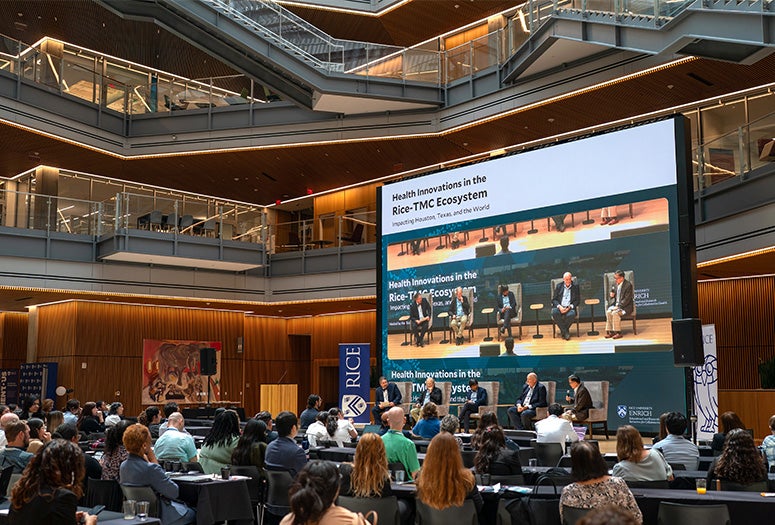The Educational and Research Initiatives for Collaborative Health (ENRICH) Office at Rice University hosted a two-day symposium highlighting the encompassing range of biomedical research at the university and the network of collaborations with institutions across the Texas Medical Center (TMC).
Titled “Health Innovations in the Rice-TMC Ecosystem: Impacting Houston, Texas, and the World” and held at Helix Park April 24-25, the event brought together more than 400 researchers, clinicians, students and biotech entrepreneurs for a deep dive into the scientific partnerships powering biomedical innovation in Houston and beyond.
“Rice University is fortunate to be located right across the street from this incredible hub of innovation and discovery,” President Reginald DesRoches said in his welcome remarks. “Whether it’s research on medical devices, data science, artificial intelligence (AI) in health care or translational medicine, Rice faculty, students and staff are working together with our partners to drive innovation and deliver impact.”
Amy Dittmar, the Howard R. Hughes Provost and executive vice president for academic affairs, emphasized Rice’s institutional commitment to collaborative health research, citing the role of strategic partnerships in advancing critical breakthroughs.
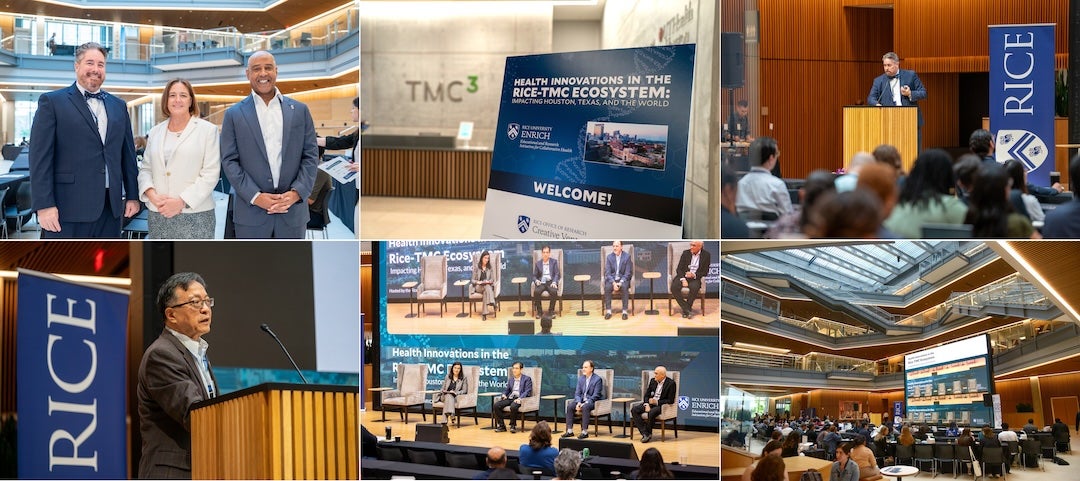
“Our partnerships make us stronger,” Dittmar said. “They accelerate innovations in health that give people a higher quality of life, enabling them to be people, not just patients, and afford them more precious time with their families.”
She encouraged attendees to engage with the ENRICH Office as it prepares to expand its footprint into Helix Park and continues building bridges between Rice researchers and the medical institutions across the street.
Michael King said he envisioned the symposium as a unifying event to showcase the full spectrum of biomedical work at Rice, from discovery science and translational research to clinical innovation and startup commercialization. King, Rice’s E.D. Butcher Chair of Bioengineering, special adviser to the provost on life sciences collaborations with the TMC and associate vice president for research, physical and life sciences and engineering, served as symposium chair. The ENRICH Office, which fosters strategic partnerships between Rice and the TMC, played a pivotal role in shaping and executing the event.
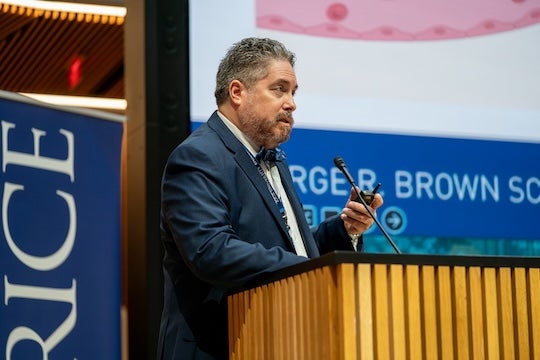
“What stood out to me was the sheer range of ideas and people in the room, from undergraduates to industry leaders ⎯ all focused on solving urgent health challenges,” King said. “That’s the kind of environment where innovation actually happens. It is a perfect embodiment of Rice’s strategic vision for leading innovations in health ⎯ both great science and collaboration that turns discovery into real impact.”
The structure of the event reflected Rice’s strategic priorities in the next decade, featuring four themed sessions and several special topics reflecting some of the most urgent and transformative areas in biomedicine today — areas where Rice and TMC researchers are helping define the future of care. The core sessions covered innovations in cancer research, AI in health care, multidisciplinary neural research and technology designed to reduce health disparities. Each session was anchored by a keynote address from a leading voice in the field in the Rice-TMC ecosystem and was followed by a series of presentations from Rice and TMC researchers, closing with a panel discussion.
Cancer research and immunotherapy
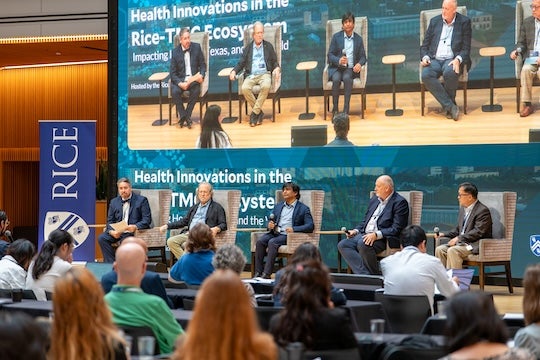
Cancer remains one of the most complex and fast-moving frontiers in biomedical science, and recent years have seen a surge in immunotherapy breakthroughs that are changing treatment paradigms. The session on cancer research highlighted the roles of immunology and bioengineering in shaping the next generation of diagnostics and therapies — from targeted drug delivery to novel imaging technologies. Rice faculty and partners across the TMC ecosystem are advancing promising new approaches that blend biological insight with engineering precision, including efforts to accelerate translation through cross-institutional initiatives like the Cancer Bioengineering Collaborative with the University of Texas MD Anderson Cancer Center.
AI in health care
AI is rapidly transforming medicine, offering new tools for early detection, clinical decision support and operational efficiency. This session explored how AI can personalize care, streamline hospital workflows and extend treatment beyond the clinical setting, empowering patients and improving outcomes. Researchers presented work on AI-driven models for drug discovery, pathogen detection and patient monitoring. The session also emphasized Rice’s growing leadership in this field through efforts like the Ken Kennedy Institute and the Digital Health Institute, a major collaboration with Houston Methodist.
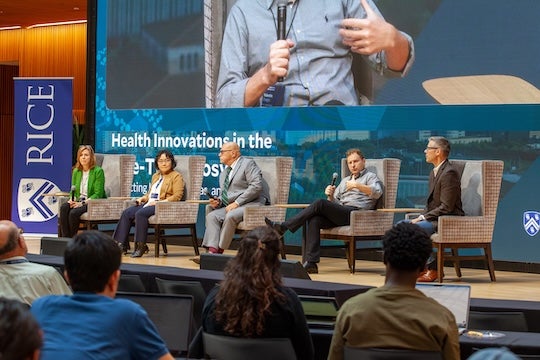
Multidisciplinary neural research
Understanding and intervening in the brain and nervous system is one of medicine’s most pressing challenges. The neural research session highlighted engineering approaches to neurorehabilitation, neuroprosthetics and brain-computer interfaces — technologies with the potential to restore function, improve quality of life and address mental health conditions. Rice’s close partnership with Houston Methodist has coalesced into joint research and clinical innovation centers such as the Center for Neural Systems Restoration and Center for Human Performance.
Health disparities and access
The final session focused on technologies designed to address persistent health disparities. From low-cost medical devices serving newborn and maternal health to innovations in remote technologies for health resilience, radiation treatment optimization and early cancer detection, this track spotlighted the critical role of engineering and translational science in creating more equitable health outcomes. Faculty shared work aimed at making care more accessible, sustainable and responsive to underserved communities, both locally and around the world, including through entities such as the Rice360 Institute for Global Health Technologies and the Institute of Health Resilience and Innovation.
Translating discovery into lifesaving therapies
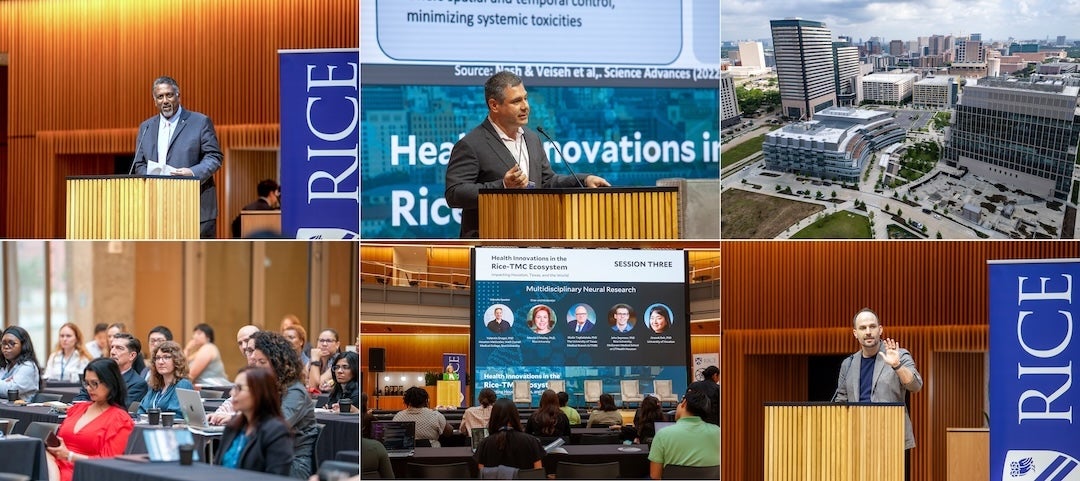
Special topic sessions focused on TMC innovation, team science and collaboration and translation and commercialization. Held on the second day of the symposium, the special topic segment on commercialization featured Rice’s Omid Veiseh and Jacob Robinson sharing their experience shepherding scientific breakthroughs through the challenges on the journey to market.
Veiseh, a professor of bioengineering and director of the Rice Biotech Launch Pad, discussed his team’s development of implantable “pharmacies” that use engineered cells to deliver biologic drugs inside the body, offering more consistent, cost-effective treatment for diseases like cancer. A first clinical trial is expected to launch at MD Anderson within a year.
Robinson, a professor of electrical and computer engineering and bioengineering who is co-founder and CEO of Motif Neurotech, shared the personal and scientific journey behind his wireless brain implant for treatment-resistant depression, a technology born in the lab that is currently en route to market. Powered by magnetoelectric materials, the device is designed for daily, noninvasive neuromodulation.
Spotlighting the future
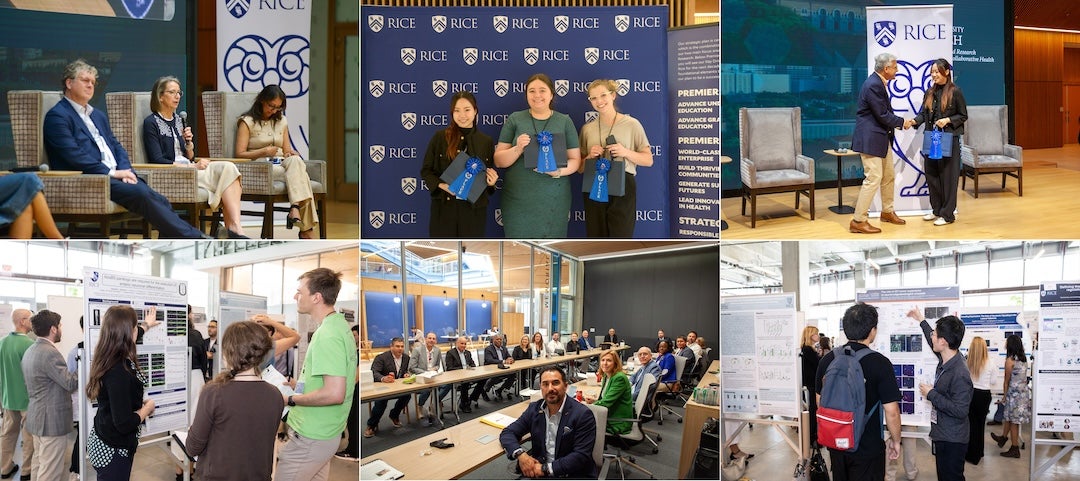
The Health Innovations Poster Competition showcased the exceptional research and innovation within the Rice-TMC postdoctoral and student community with 60 abstracts submitted across the four conference tracks. Participants included students at the undergraduate, graduate and postgraduate stage, reflecting a diverse and vibrant research community. The competition highlighted the strong collaborative spirit between the university and its partners with abstracts from Rice, Baylor College of Medicine, MD Anderson, UT Health Schools, University of Houston and UT Medical Branch. Many Rice students were mentored by faculty at these institutions, and the 23 judges who reviewed the posters also represented this broad coalition.
With a program that spanned foundational science, cutting-edge applications and real-world deployment, the Health Innovations Symposium marked a milestone in Rice’s efforts to lead in health innovation. King said he hopes this will be the first of many campuswide convenings that drive scientific momentum and create lasting partnerships.

